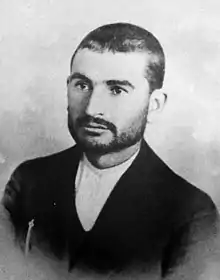Hosein Lorzade
Hosein ebn-e Mohammad Lorzade (Persian: حسین ابن محمد لرزاده; c. 1906 - 14 September 2004) was an Iranian traditional architect/mimar. He is credited for building a large number of mosques (approximately 864), palaces and other buildings. His most notable works include: the Tomb of Ferdowsi, parts of Sepahsalar Mosque, various buildings in Sa'dabad Complex, sections of Imam Husayn Shrine in Karbala and many more.[1] He was a known for his knowledge of variant traditional Persian architecture ornaments, such as Kaseh-sazi.[2]
Hosein Lorzade | |
|---|---|
 Hosein Lorzade in 1936 | |
| Born | Hosein ebn-e Mohammad Lorzade 1906 Tehran, Iran |
| Died | 14 September 2004 (aged 97–98) Tehran, Iran |
| Nationality | Iranian |
| Occupation | Architect |
| Awards | Medal of Ferdowsi (1934), First Order of Homayun (1950) |
Biography
Lorzadeh was born in 1906 in Tehran. His father, Master Mohammad, was one of the renowned architects of his time and was a colleague of Haj Hassan Sani’ al-Divan. He studied under Master Mirza Hassan as young child. He went on to study sculpture at the Kamal-ul-Molk High School, and continued his studies with Seyed Mohammad-Taqi Naqash Bashi.[3]
His house was transformed into a museum in 2019.[4]
Gallery
 Kaseh-sazi by Lorzade
Kaseh-sazi by Lorzade Winter shabestan of Sepahsalar Mosque by Lorzade
Winter shabestan of Sepahsalar Mosque by Lorzade
References
- Ayatollahi, Habib (2003). The Book of Iran: The History of Iranian Art. UK: Alhoda. ISBN 9789649449142. Retrieved 15 January 2020.
- "درباره استاد حسين لرزاده، افتخار معماري ايران". Hamshahri Newspaper. 8 April 2003. Retrieved 15 January 2020.
- "Master Islamic architect Lorzadeh dies at 98". Mehr News. 15 September 2004. Retrieved 20 January 2020.
- "Master Lorzadeh's house opened on Tehran's week on the occasion of Architecture's Day". Zibasazi.ir. Tehran beautification Organization. 13 October 2019. Retrieved 20 January 2020.